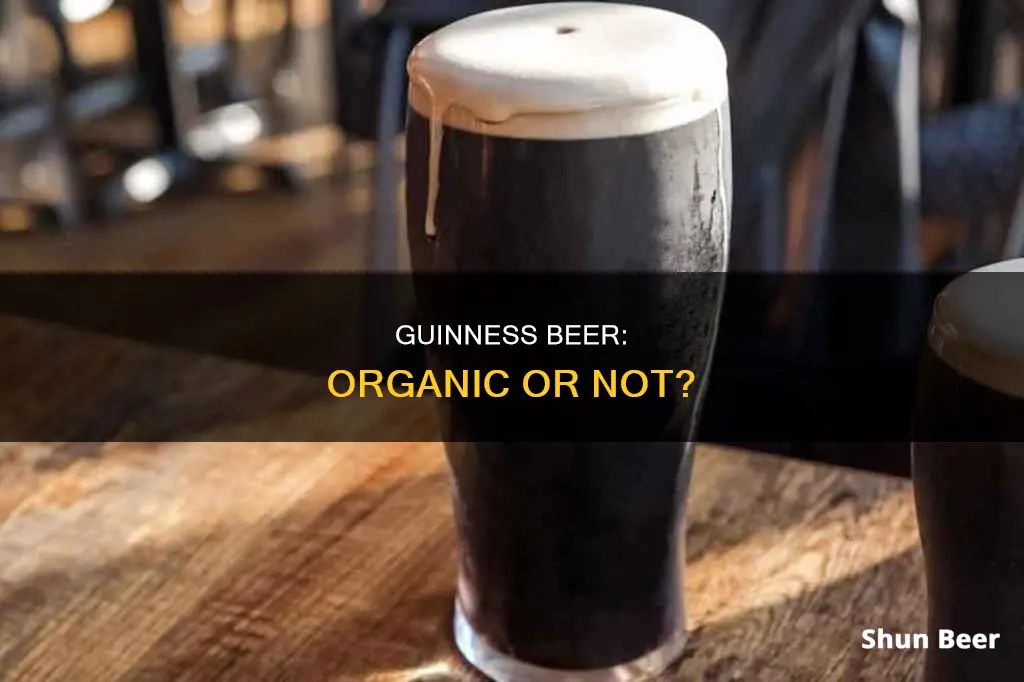
Guinness is a popular stout beer that originated in Dublin, Ireland, in the 18th century. It is now available in over 120 countries and is considered one of the most successful alcohol brands worldwide. While Guinness has a distinct flavour and a loyal customer base, some consumers are curious about its organic and vegan credentials. So, is Guinness beer organic?
| Characteristics | Values |
|---|---|
| Organic | No |
| Vegan | Yes |
| Vegetarian | Yes |
What You'll Learn

Guinness is now vegan-friendly
Guinness is a dry Irish stout that has been brewed for over 260 years and is currently manufactured in five countries worldwide. It is one of the world's most popular drinks, with 10 million pints consumed daily and 1.5 billion pints enjoyed annually.
Prior to 2016, Guinness was not suitable for vegans due to the use of isinglass in its filtration process. Isinglass is a collagen product that helps remove excess yeast from the stout, resulting in a clear beverage. However, it also meant that Guinness was not vegan-friendly.
In 2015, Diageo, the company that manufactures Guinness, announced it would be implementing a new filtration system to eliminate isinglass from the manufacturing process. Stephen Kilcullen, master brewer and head of quality for Guinness, stated that they had been looking for an alternative solution for some time but were unable to find one that preserved the signature ruby red colour of Guinness. Finally, in April 2016, Diageo confirmed that all kegs of Guinness on the market were vegan-friendly.
It is worth noting that while Guinness was vegan-friendly in keg form starting in 2016, it took until 2018 for the company to confirm that all Guinness products worldwide, including bottled and canned formats, were also isinglass-free and suitable for vegans. This delay was due to the manufacturer's inability to guarantee that old stock of bottled and canned Guinness had been filtered using the new process.
Today, vegans can enjoy a variety of Guinness products, including Guinness Draught, Guinness Extra Stout, and Guinness Foreign Extra Stout, knowing that no animal products have been used in the brewing process.
Understanding Beer Expiry Dates: A Guide for Guinness Lovers
You may want to see also

Guinness is not organic
Guinness is not an organic beer. Organic beer is made with ingredients that have been grown without the use of synthetic pesticides or fertilizers. The term "organic" is used on food products that are certified to meet certain standards set by the U.S. Department of Agriculture (USDA). For a beer to be labeled as organic, at least 95% of the ingredients must be certified organic.
Guinness is a stout that originated in the brewery of Arthur Guinness at St. James's Gate, Dublin, Ireland, in the 18th century. It is now owned by the British-based multinational alcoholic beverage maker Diageo. Guinness is made from water, barley, roast malt extract, hops, and brewer's yeast. A portion of the barley is roasted to give Guinness its dark colour and characteristic taste. It is pasteurised and filtered.
While Guinness may be a healthy beer option, it is not organic. The company has, however, taken steps to make it suitable for vegetarians and vegans by introducing a new filtration process that avoids the use of isinglass from fish bladders to filter out yeast particles. This change was made in response to feedback from vegan and vegetarian consumers, and it is a significant shift for the company as they had been using isinglass since the 19th century.
Guinness has a long history of marketing campaigns and is one of the most successful alcohol brands worldwide, brewed in almost 50 countries and available in over 120. The company has been working alongside Irish barley farmers to support them in transitioning towards regenerative agriculture. They aim to scale the adoption of practices that employ nature-based solutions to support the production of low-carbon barley and improve shared natural resources. However, this does not make Guinness an organic beer as it does not meet the certification standards set by the USDA.
Guinness Beer: Understanding Its Unique Percentage Composition
You may want to see also

The company is transitioning to regenerative agriculture
Guinness is committed to sustainability and preserving the natural resources it depends on. The company is only 264 years into its 9,000-year lease at St James’s Gate and is working towards a better, more sustainable future. As part of this effort, Guinness is undertaking the most ambitious regenerative farming project in Ireland. This three-year pilot project involves working with Irish farmers to define the most effective regenerative agriculture practices that improve the health of barley, the soil, and farmer livelihoods. The project aims to put back more into the environment than it takes out.
Regenerative agriculture is an approach to farming that works in harmony with nature. Guinness is supporting barley farmers in this three-year project to explore and trial nature-based, sustainable farming practices. The project has five key outcomes:
- Regenerate soils and sequester carbon
- Enhance habitat biodiversity on farms
- Reduce the use of synthetic chemicals
- Protect farmer livelihoods
- Improve water quality
Guinness is working with 44 barley farmers from across Ireland to help achieve its goals and support them in transitioning to regenerative agriculture. The company collects baseline data to measure the current carbon footprint of barley production and identify ways to reduce emissions without compromising crop yield or grain quality. This data will be shared with supply chain partners and industry experts to encourage continued learning and improvement in regenerative agriculture for barley production.
The pilot project will provide a blueprint for scale-up opportunities in Ireland and other countries where Diageo sources raw materials. Guinness is providing participating farmers with a digital management system to manage their crops and record their practices using technologies such as satellite monitoring, yield monitoring, and cover crop assessments.
Cover crops are mixtures of biodiverse teams of beneficial plants grown between harvesting one crop and planting another. They protect and improve soil health by recycling nutrients. Guinness tripled the amount of cover crop seed distributed from 7 to 21 tonnes in the second year of the pilot. The company monitors and analyses every cover crop to determine how much carbon, nitrogen, phosphorus, and other nutrients can be recycled into the soil, building performance and resilience for future barley crops.
Guinness's regenerative agriculture pilot is part of Diageo's wider 10-year sustainability action plan, Spirit of Progress, and the company's commitment to achieve net-zero carbon emissions across its direct operations and a 50% reduction in scope 3 emissions by 2030.
Guinness Beer: A Natural Laxative?
You may want to see also

Guinness is one of the healthiest beers
Guinness, the famous stout beer, has long been associated with the slogan "Guinness is good for you". While it may not be as healthy as a vegetable, stouts like Guinness may have some nutritional benefits.
Most beers contain significant amounts of antioxidants, B vitamins, soluble fibre, and prebiotics, which promote the growth of "good" bacteria in the gut. Guinness stands out for its folate content among imported beers. Folate is a B vitamin that is essential for making DNA and other genetic material, as well as cell division. According to research by brewing expert Charles Bamforth, stouts typically contain 12.8 micrograms of folate, or 3.2% of the recommended daily allowance.
Guinness is also one of the beers with the highest levels of fibre due to its high unmalted barley content. The use of nitrogen gas in Guinness gives it smaller, more stable bubbles and a smoother, creamier mouthfeel. This also tempers the harsh burnt flavour that comes from the roasted barley.
In terms of calories, Guinness Draught has 125 calories in a 12-ounce serving, compared to Budweiser's 145, Heineken's 142, and Samuel Adams Cream Stout's 189. The lower calorie count in Guinness is due to its lower alcohol content, which is 4.2% ABV compared to 5% for Budweiser and Heineken, and 4.9% for Samuel Adams Cream Stout.
Moderate alcohol consumption, defined as no more than two drinks per day for men or one drink per day for women, may offer some health benefits. It is linked to a reduced risk of heart disease and overall mortality. However, heavy drinking and binge drinking are associated with serious health issues, including liver disease, pancreatitis, and high blood pressure.
While Guinness may not be a cure-all, it does have some nutritional advantages over other beers. However, it is important to consume alcohol in moderation and be aware of its potential health risks.
Guinness Beer: Hoppy or Not?
You may want to see also

The beer is available in over 120 countries
Guinness beer is available in over 120 countries. The beer, which originated in Dublin, Ireland, in the 18th century, has become one of the most successful alcohol brands worldwide. Its global popularity is a testament to its unique taste and cultural significance.
The story of Guinness began in 1759 when Arthur Guinness signed a 9,000-year lease for the St. James's Gate Brewery in Dublin. Over the years, Guinness beer has become synonymous with Ireland and its culture. The iconic harp motif on the Guinness logo, for example, has been a symbol of Ireland since the reign of Henry VIII.
Guinness is now brewed in almost 50 countries and is available in even more. This wide reach is due in part to the company's early commitment to exporting their product. As early as 1769, just ten years after Arthur Guinness started brewing, he shipped barrels of his ale to Great Britain.
Today, Guinness is enjoyed in countries all over the world, including Europe, Africa, Asia, and the Americas. The brand has a significant share of the African beer market, with about 40% of its total volume being brewed and sold on the continent. In Nigeria, for instance, Guinness Extra Smooth is a popular variant.
In addition to its availability in various countries, Guinness has also adapted its beer to suit different cultural preferences. The alcohol content of Guinness Foreign Extra Stout, for example, varies depending on the market. In China, it has an ABV of 5%, while in Singapore, it is 8%.
Guinness has also made efforts to cater to different dietary needs. In 2017, the company introduced a new filtration process that made the beer suitable for vegetarians and vegans by eliminating the use of isinglass, a substance derived from fish bladders. This change not only made the beer more inclusive but also reduced the environmental impact of fishing for fish parts.
Guinness Beer: A Source of Vitamins?
You may want to see also
Frequently asked questions
No, Guinness beer is not organic. In order for a beer to be labelled as organic, at least 95% of the ingredients must be certified organic. Guinness is made from water, barley, roast malt extract, hops, and brewer's yeast. While the company has been working with Irish barley farmers to support them in transitioning towards regenerative agriculture, there is no indication that the other ingredients are sourced organically.
Organic beer is beer that has been brewed with certified organic ingredients. Organic beer is generally made with ingredients that have been grown without the use of synthetic pesticides, herbicides, and fertilizers. The soil used to grow the ingredients must also be free from chemicals for at least three years, and no GMOs are allowed to be present.
Organic beer is considered healthier than non-organic beer as it does not contain harmful chemicals. It is also better for the environment as it does not contribute to chemical runoff that can contaminate water sources and ecosystems.







